L.A. is slammed with record costs for legal payouts
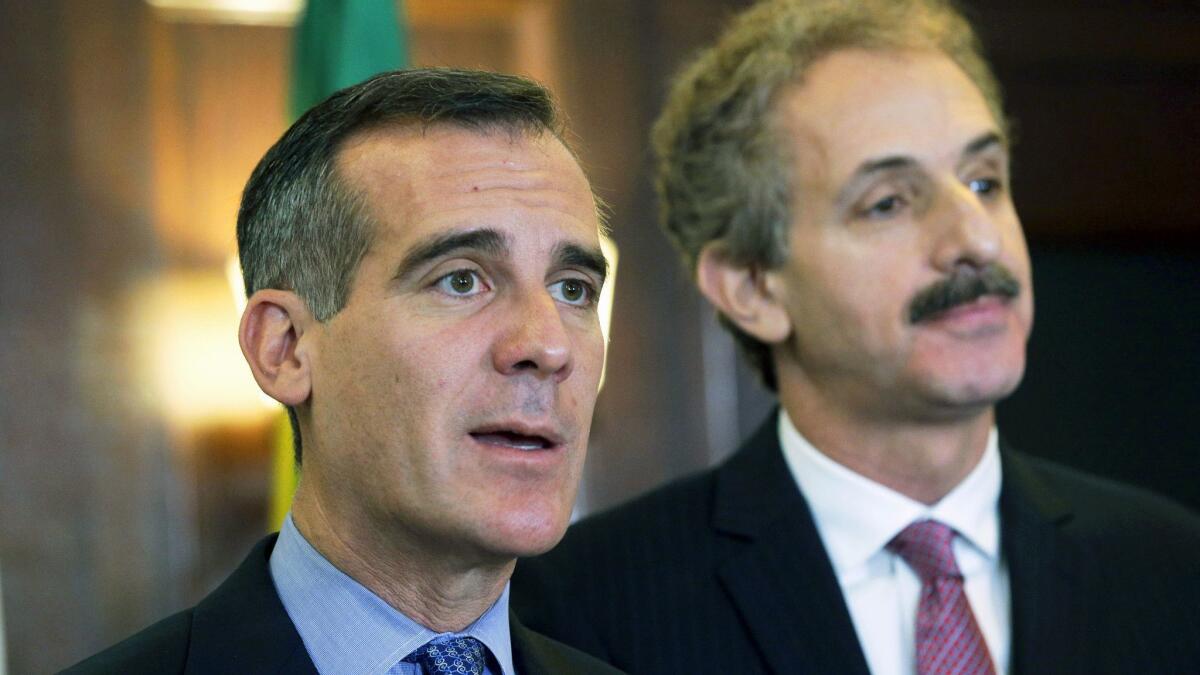
Los Angeles has spent soaring amounts in recent years to end legal disputes over dangerous roads, police misconduct and other alleged wrongdoing, depriving the city of money that could fund other pressing needs.
Last budget year, the city paid out more than $200 million in legal settlements and court judgments — a record amount that was more than the city spent on its libraries or fixing its streets.
The annual total is expected to drop sharply in the budget year that ends Saturday, but remains much higher than just a few years ago.
The surging cost of legal payouts has been a drain on the city budget as elected officials struggle to address serious challenges, including a backlog of broken streets and mounting demands to combat homelessness.
“The numbers are too damn high,” said Jay Handal, co-chair of the Neighborhood Council Budget Advocates. “Look at how much we pay out as a city. And then look at the services we don’t get.”
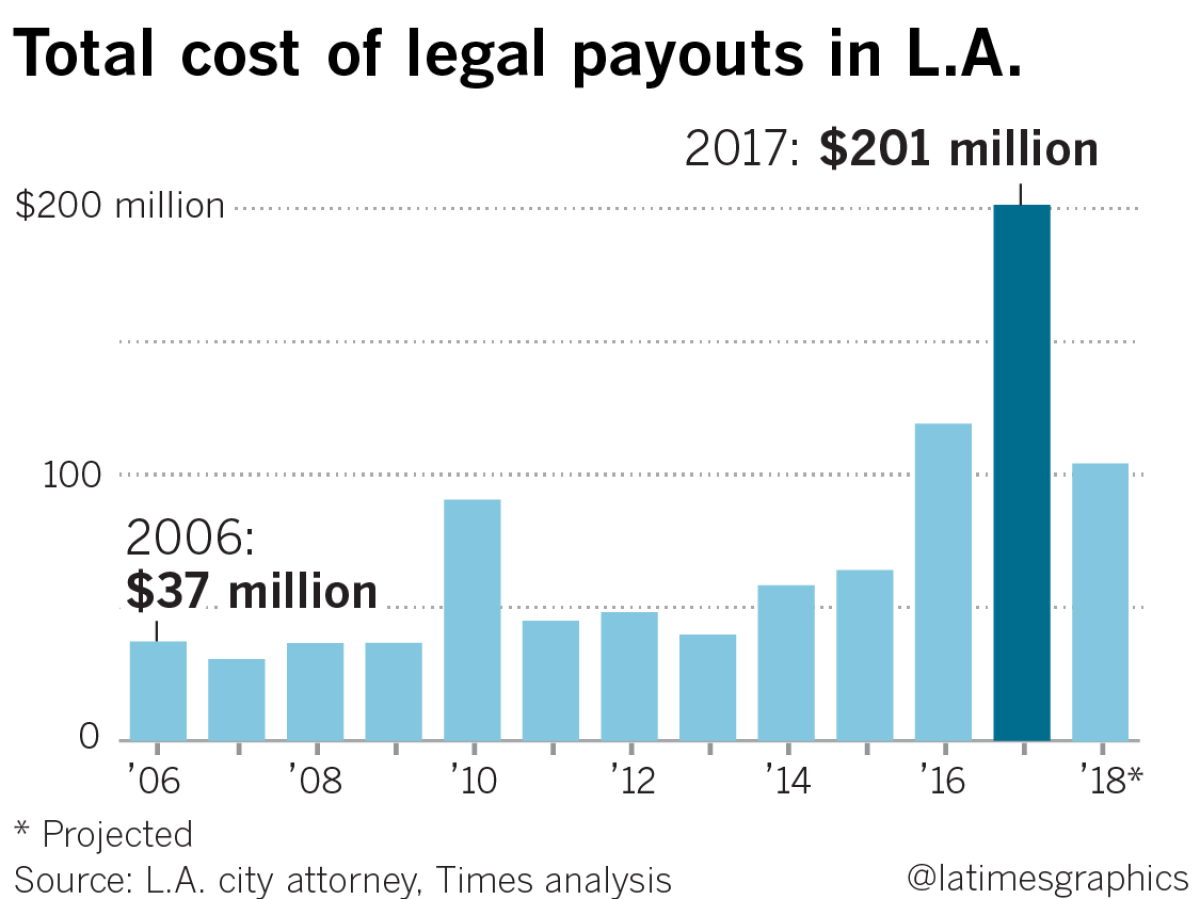
The sharp rise has happened under City Atty. Mike Feuer, who argued that his office has not been soft on settlements. “We are fighting, contending, grappling with cases at a much higher rate than is average in California,” Feuer said, citing state statistics on how many cases go to trial.
Instead, Feuer pointed to deep cuts made during the last recession, which he said had worsened a longtime failure to properly fund street and sidewalk repairs, and ultimately spurred more payouts.
“It’s no surprise to me that that pattern of disinvestment, escalating during the course of those years, would give rise to an increase in claims,” Feuer said.
Mayor Eric Garcetti said that many recent payouts are not a reflection of what is happening now, but “things that happened five years ago or 25 years ago.”
Both Feuer and Garcetti stressed that the surge is tied to a few cases with extraordinarily large payouts: Last budget year, a class-action lawsuit over a telephone tax cost the city $45 million. In another case, more than $23 million went to the family of a motorcyclist killed at a San Pedro intersection.
And the city spent an additional $21 million last budget year in a case alleging that L.A. failed to make sure enough publicly funded housing was accessible to people with disabilities.
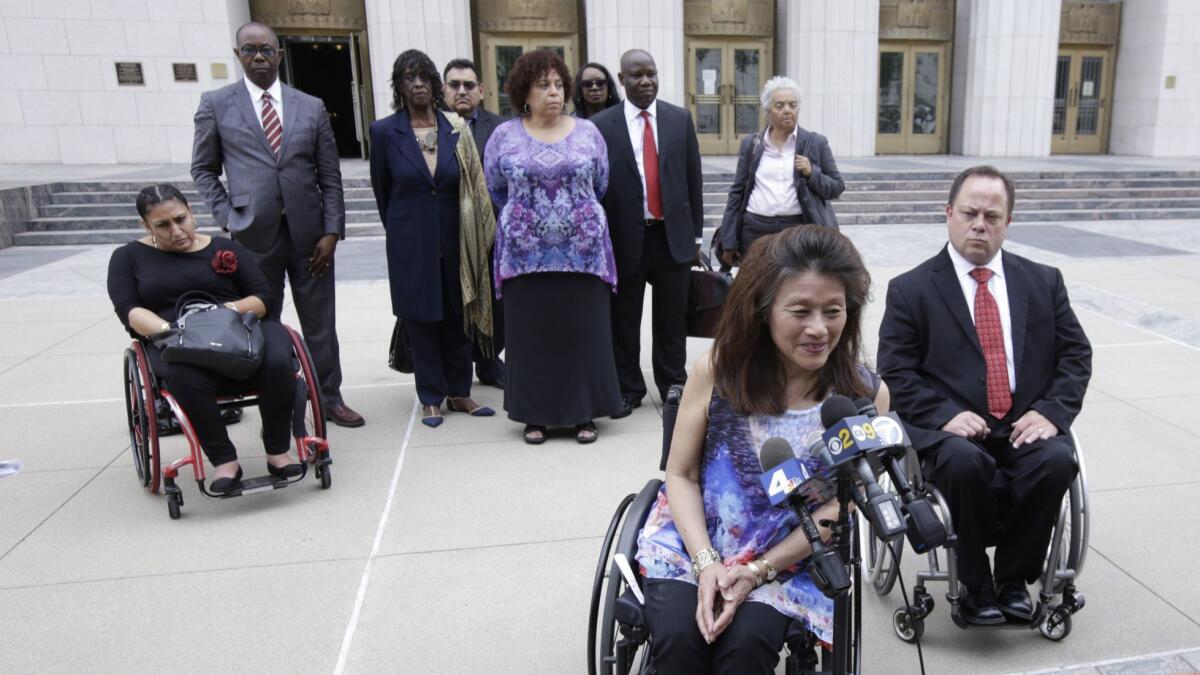
Fewer payouts, more money
Beyond the mammoth cases, a pileup of other large payouts has padded the tab, a Times analysis of city payouts found. While the total number of payouts has dipped over time, the average amount has increased. Last budget year, the city paid out 30 settlements of $1 million or more — five times as many as a decade before.
The Times analyzed a city database listing more than 18,000 payouts dating back to July 2005, obtained through a public records request.
Thousands of legal battles involving the Los Angeles Police Department, including a rash of recent settlements over police shootings and wrongful imprisonment, have added up to more than 40% of the total — a higher sum than any other city department, the analysis showed. That includes more than $24 million paid to two men who were freed after decades in prison, along with lawsuits over arrests, injuries, car crashes and alleged retaliation and discrimination against its own employees.
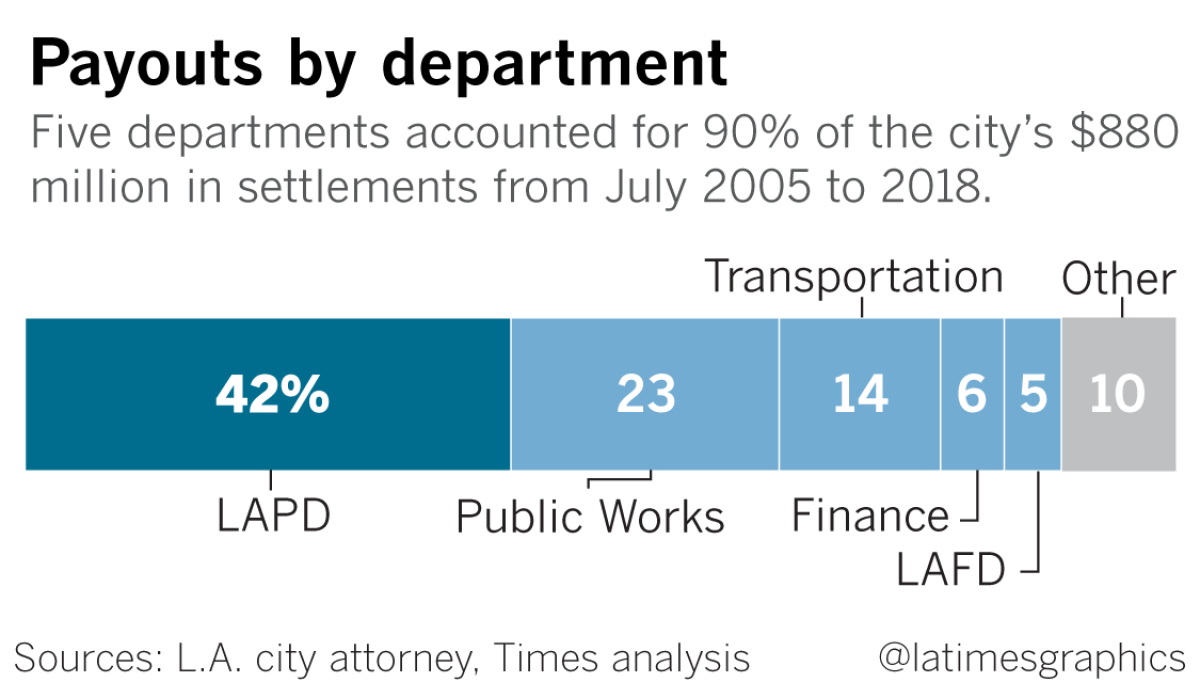
Lawsuits tied to the city departments that oversee its streets and sidewalks, including the Bureau of Street Services and the Department of Transportation, accounted for a growing share. Legal payouts for “dangerous conditions” have rivaled and, last budget year, even exceeded the cost of lawsuits over police misconduct, the analysis found. In May, the city attorney’s office warned that there had been “unprecedented growth” in such payouts.
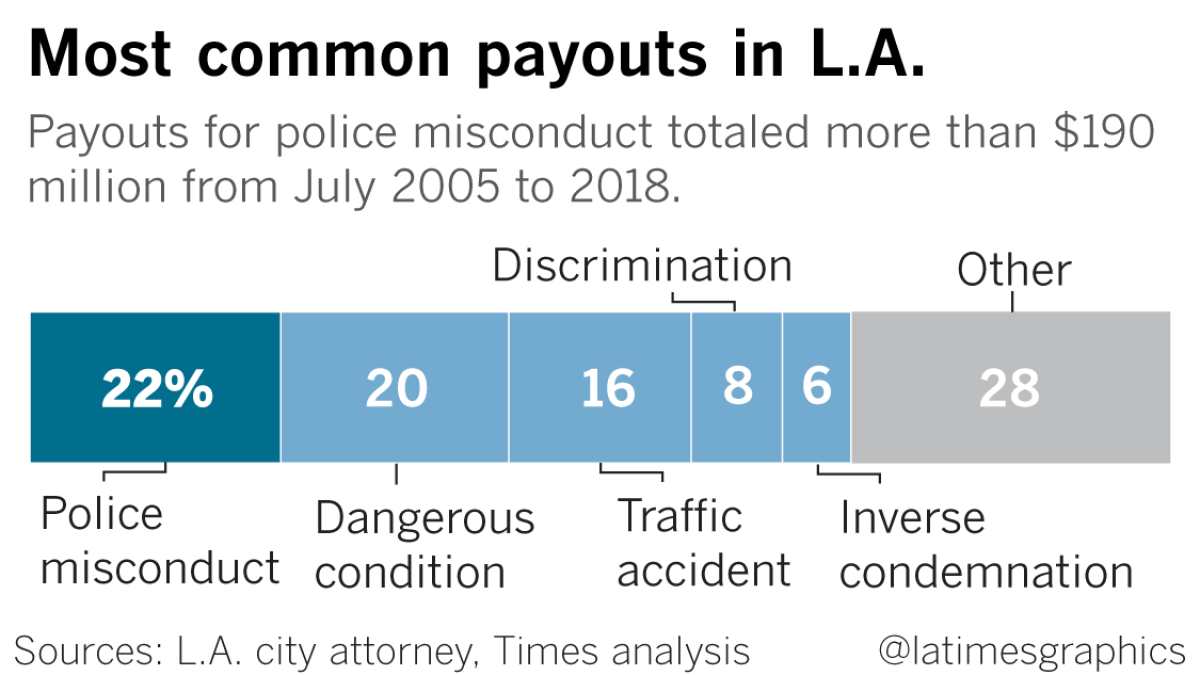
Many cases have arisen from people being wounded or killed while crossing city streets: In recent years, the city agreed to pay $15 million to end a legal battle over a man who was gravely injured while crossing Franklin Avenue in Hollywood, another $15 million to the family of two girls hit in a North Hollywood crosswalk and $9.5 million to the family of a teenage girl fatally struck by a taxi near Dockweiler State Beach.
The surge also has included a boom in payouts tied to bicycle crashes. Seleta Reynolds, who heads the city Department of Transportation, said that until a few years ago, “the department had not had enough of a coordinated and rigorous approach to inspecting pavement before we put in bike lanes.”
Last budget year, the total for all types of payouts reached $201 million — the highest on record — but city officials are unsure whether that is the largest amount because records go back only two decades.
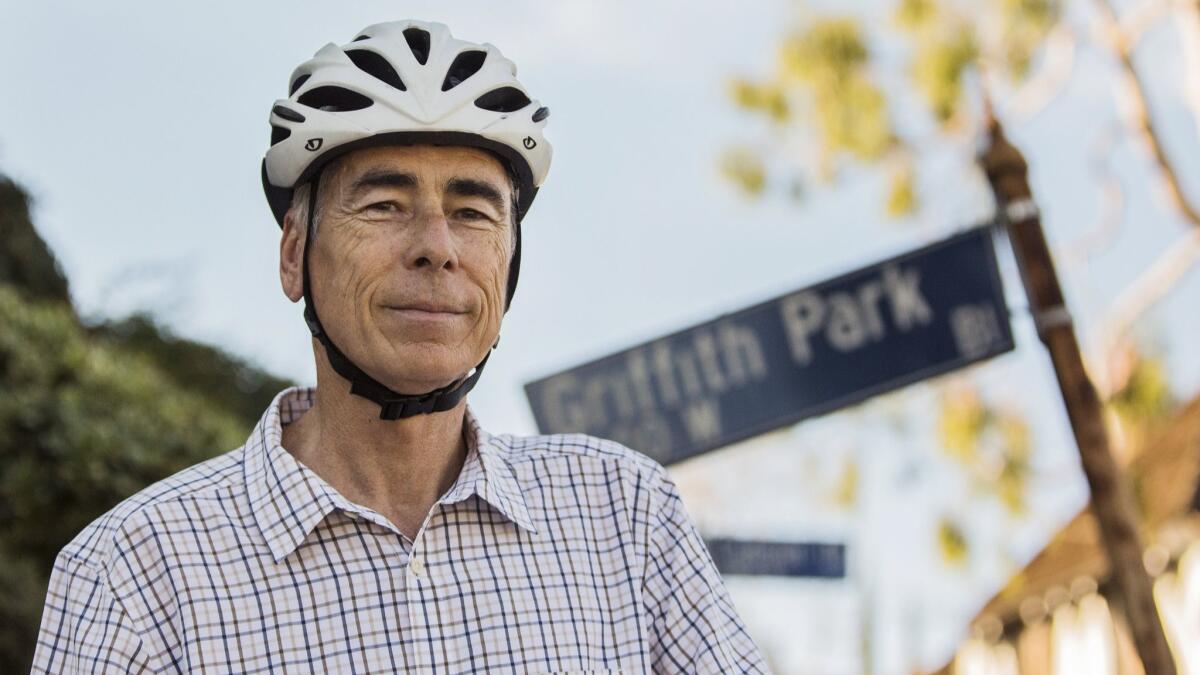
Concern about jury awards
Boston attorney Leonard Kesten, who routinely represents cities, said that changing attitudes about sexual harassment and police shootings have increased the risk that juries will award hefty amounts. That, in turn, nudges municipalities to agree to higher settlements than they might have in the past, Kesten said.
“You look at your odds of winning — and if you lose, how much you might lose,” Kesten said.
An L.A.-based lawyer, Dan Balaban, suggested payouts may be up because juries are shedding their reluctance to demand big amounts from the city during the economic downturn.
“It took years for the mindset of the jury to come out of that,” said Balaban, one of whose clients reached a $15-million settlement with the city last year. “The perception was that the city didn’t have the money.”
And another local attorney, Gabriel Avina, said that technology has bolstered claims against cities.
“It’s way different than 10 years ago,” Avina said. “Now almost every person who walks in L.A. can videotape, can record, can take pictures with metadata that has the exact time. It’s a reason why cases are becoming more valuable.”
Now almost every person who walks in L.A. can videotape, can record, can take pictures.
— Attorney Gabriel Avina
Some other big cities, including New York City and San Diego, also have seen legal costs rise in recent years, but the steep increase in Los Angeles is not mirrored in other major metropolises, including Chicago, Houston and Dallas, which provided information on their total legal payouts in response to requests from The Times.
To clamp down on legal costs in the future, Garcetti and other officials formed a cabinet focused on “risk reduction” last year, which backed new protocols for handling allegations of employee harassment, additional training for city workers and increased spending to repair streets and other infrastructure, including badly broken bikeways.
Both Feuer and Garcetti said the city has improved the way it tracks legal liability to detect trends and come up with solutions. Departments are required to report on “risk management” every quarter and also were asked, during budget planning, to focus on investments that could help address legal risks, according to the mayor’s office.
“We are not flatfooted looking at this,” Garcetti said.
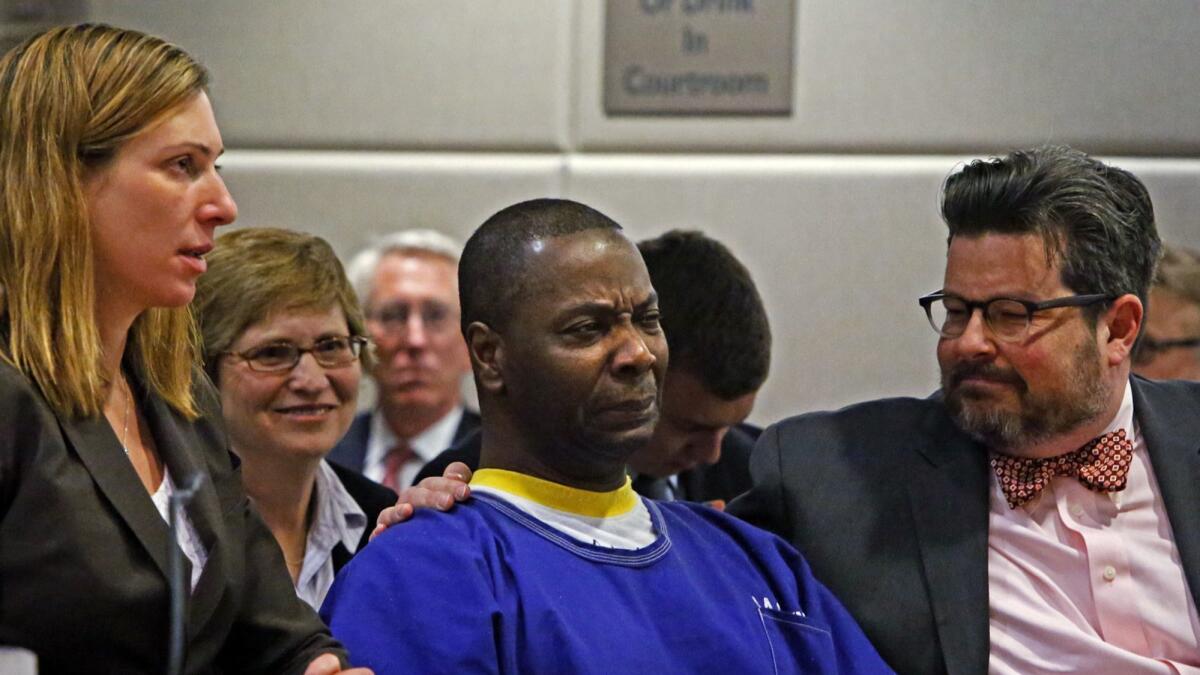
L.A. seeks to manage risk
Feuer said that two years ago, the city attorney’s office hired its first risk manager to analyze and eliminate problems that cause payouts. And the city is funding a handful of additional positions in the office next year to focus on reducing the risk of costly litigation.
“It’s never been like this before,” Feuer said.
He named a string of changes in city practices meant to curb liability, including how 911 operators find addresses during emergencies. That change, he said, followed an investigation — and ensuing settlement — into the death of a teenager in Wilmington.
When he was a councilman years ago, Feuer said, “there was not an aggressive effort being made to collaborate across these artificial jurisdictional lines within city government, to actually get to the root of a problem ... all toward the goal of trying to find ways to prevent someone from being victimized in the first place.”
City Councilman Paul Krekorian, who oversees a council committee focused on the budget, said he was heartened that there had been a recent drop in the number of cases filed against the LAPD, which he credited to changing practices.
“If the number of claims is going down, that tells you that you’re doing something right,” Krekorian told The Times.
Legal payouts for this budget year are estimated to total around $109 million. Although the city is spending less on payouts this year than last, it also has been saddling future budgets with payout costs, committing up to $16 million next budget year to help pay off settlements that it already has approved.
Krekorian said paying off steep settlements over time may be necessary, but “if that becomes the routine, then you’ve got a real problem,” comparing it to “paying for the mortgage on a credit card.”
In the broader region, Los Angeles County also is spending more on legal payouts than it used to, but that increase is much more modest than what L.A. has undergone. Unlike the city, Los Angeles County takes the cost of payouts out of the budget for the county department that was involved. County officials said that charging the departments gives them an incentive to fix problems that could put them at risk of costly lawsuits.
If the city did the same, “they’d clean up their act,” said Handal, the neighborhood budget advocate.
But city officials have shunned that idea. Garcetti said that it would be unfair to penalize departments for problems dating back years or even decades, and that cutting funding for police or street repairs would be “shooting yourself in the foot.”
To learn more about the methodology and review the computer code that generated this analysis, visit github.com/datadesk/la-settlements-analysis.
Times staff writers Cindy Chang and Jon Schleuss contributed to this report.
Twitter: @AlpertReyes
Twitter: @palewire
More to Read
Sign up for Essential California
The most important California stories and recommendations in your inbox every morning.
You may occasionally receive promotional content from the Los Angeles Times.












